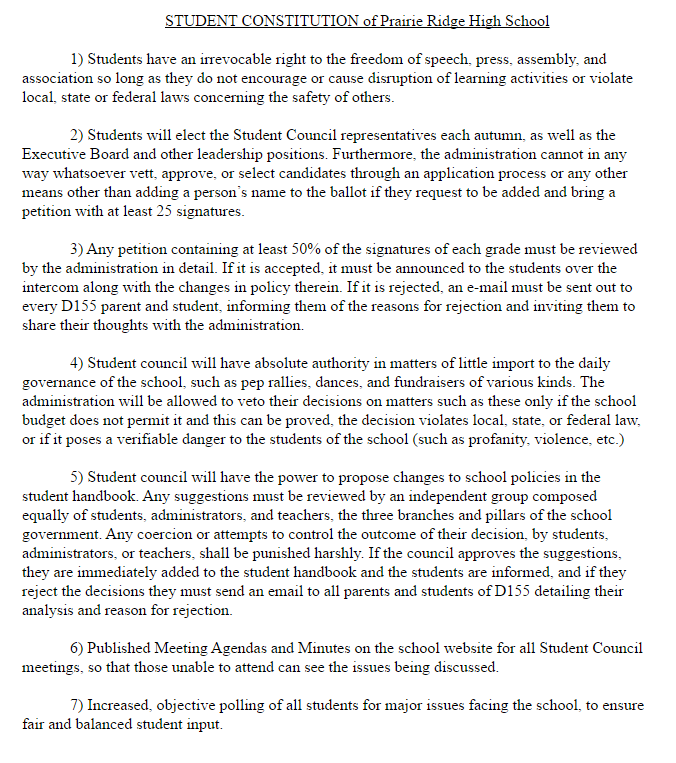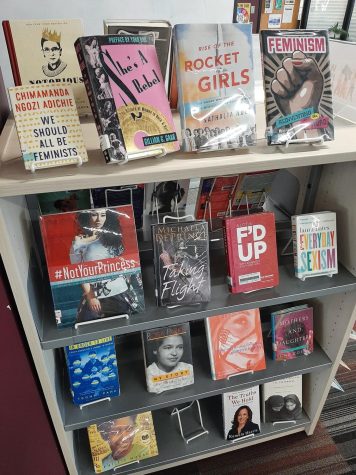Powers of Three
The number three remains so ubiquitous in America that it seems every story or idea should be grouped into three. Even the three branches of government seem as if they fit perfectly together through some intangible, incredible quality of the number three. Yet we find ourselves missing the most important group of three from our school, for we are lacking the checks and balances created by the three branches of government.
We have an executive branch, the administrators enforcing the laws of the state, city, and student handbook. We have a judicial branch, the teachers who interpret their dictated classes by creating lesson plans and nobly ensuring the equal opportunity for students to succeed. But we have no legislative branch. We have no ability to communicate with administrators what we, the students of Prairie Ridge, or for that matter all students of D155, truly desire. Of course, the administration says that our opinions matter, that there are outlets for student involvement in this school, but these are merely facades, as students have no real power, merely ‘advisory’ roles. The entire purpose of democracy is not to ‘advise’ our leaders, it is to guide them, and provide a check on their power. An absolute monarch can have ‘advisors’; only a democracy can have representatives. By the current adult leader of student council’s own words, democracy is when “[people] can vote and have their vote count…” By any context, this means PR is not a democracy, and was never intended to be one. Of course, the school should not exercise the same power the legislative branch does over the President, but there must be a way for students to influence the administration in a manner that ensures they will not dismiss student opinion lightly.
The administration has claimed that “we want students to have a voice to speak up to help us rewrite rules or policy…” Yet the administration did nothing with a petition asking them to revisit the prom dress code and outlining student complaints with it. Furthermore, after Student Council voted on and chose the Jungle theme, the administration overrode their vote and switched the theme to PR Pride, a theme not even proposed by student council general council members, clearly showing that the administration does not believe that the students should have leadership, the “ability to make decisions.”
Yet this lack of power to make decisions extends to the very structure of student council itself. Of course, “anyone can attend” student council meetings. But the entire purpose of representative democracy is to allow those unable to attend or concerned about only a single issue at an organizational meeting to allow representatives to act in what they believe to be their best interests. In the same way, by not electing student council, Prairie Ridge High School disenfranchises students unable to attend meetings. Yet the least democratic part of student council is the selection without voting of the executive board by those adult leaders in charge of it, ostensibly because the administration “[doesn’t] want some of these leadership positions to become popularity contests” by having elections. Yet real life politics is nothing if not a popularity contest fueled by who has the most money and is the most popular, but we accept voting anyway.
Why do we though? Because voting expands the popularity contest. When individuals are appointed by the administrators or adult leaders of student council, they really undergo a popularity contest of whoever decides their application, as anyone’s most qualified candidate is the person who would perform the job most similarly to how they would. In other words, appointments are a self-fulfilling prophecy; those appointed most likely resemble those appointing. Voting expands this popularity contest to the entire population affected by their decisions, and causes those appointed to, as closely as possible, resemble the people who govern them. If our school doesn’t even trust us to vote, to appoint people who resemble our opinions and viewpoints in our school, how can they with good conscience have a voting registration booth in the foyer every election cycle? I know that if I didn’t trust students on student council, I wouldn’t trust them to vote for the government of America.
But I do believe in the students of Prairie Ridge. We deserve the right to elect our student council and its leadership positions, because without elections our voice is just a hollow sound. Democracy is knowing that our representatives can speak freely to express their opinions in a manner that affects the outcome. It is being represented and not merely heard. It is knowing that we have freely chosen those that represent our interests. It is being given the power to make decisions that the administration does not like but will not oppose. It is the power to interact with our executive and judicial branches, to shape policy outside of what dance we should go to or how much glitter we should use at school pep rallies. It is the will to take power for the students and the power to express the student’s will. Prairie Ridge does not have these things. It has advisors whose opinions seem irrelevant if the administration decides otherwise. It has an administration that takes in petitions from the students in one ear and doesn’t even bother to continue the signal to the other. It has those in power deciding who best represents the interests of those they govern. It has an adult leadership that refuses to allow the students to make intelligent decisions as they can for our country. It has an utter lack of student ability to affect school policy in meaningful decisions that the administration deems should not be run like a democracy. It has the will to take power from the students and the power to suppress the student’s will.
And so I propose a change. We must have elections for student council, and we must be given the power to effect meaningful change in the school. In order to accomplish these goals, I propose the creation of a Student Constitution, to be added to the student handbook. I invite anyone in the comment section to critique or add points to the Student Constitution in the spirit of democracy, and encourage the students of the school to discuss it and, once edited by the students, to sign it as a petition to be delivered to the administration.
These suggestions are not meant by any means to cause “anarchy” or student domination of the school. Knowing many high school students, most would likely care less and do nothing with their newfound power. But the point of this power is to finally bring into balance the three branches of our school, to allow the students to have merely a modicum of influence (that can still be vetoed transparently!) over the school. All three of us have our place and are equally important; without each other we are less than our combined whole. An America with only one of the three branches is still a totalitarian government; only with all three does America and our school become a true democracy. With these changes, Prairie Ridge could truly find a balance between the desires of the students, the mandate of the administration to ensure our learning and safety, and the will of the teachers to teach us the way they intend. Such a power of three will shine a beacon of light for others to follow, of the power of cooperation and transparency to create meaningful change rather than anarchy, and of democracy rather than hypocrisy.





Bre F. • May 24, 2016 at 11:56 pm
Thank you Joey!!! A true voice for democracy! You get my vote…